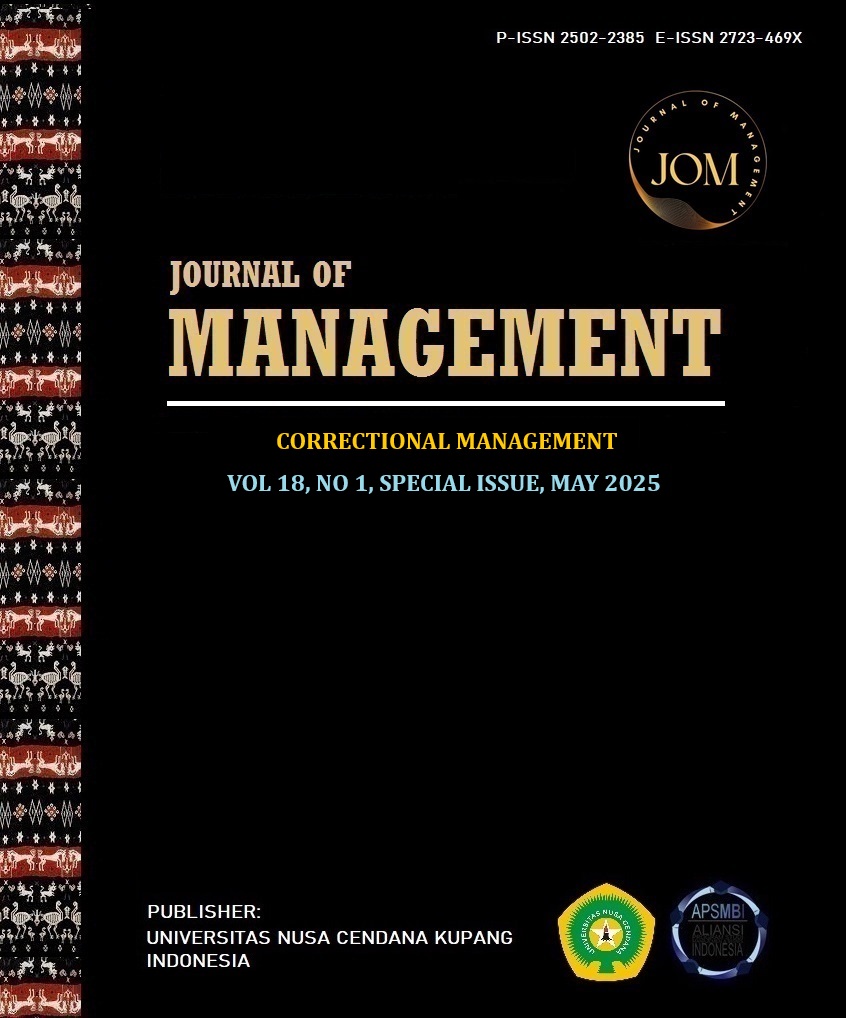ANALYSIS OF THE COMMUNICATION MODEL OF CONFIDING IN PRISONERS (CURNA) ACCORDING TO THE VIEWS OF JOSEPH A. DEVITO IN AN EFFORT TO IMPROVE THE MENTAL HEALTH OF PRISONERS AT THE CLASS IIB TRENGGALEK DETENTION CENTER
Abstract
The prison system in Indonesia underwent a significant change from the theory of retribution, which prioritizes retribution, to a correctional system that focuses more on the development and social reintegration of prisoners. This change was first introduced by Dr. Sahardjo in 1963, and officially adopted in 1964 under the direction of Dr. Baharoedin Soerdjobroto. This reform was based on respect for human rights and the need for a more just and humane system. In its development, Law Number 12 of 1995 concerning Corrections was amended to Law Number 22 of 2022, which strengthened the concept of restorative justice and social reintegration, and established various Technical Implementation Units (UPT) that carry out correctional functions. Class IIB Trenggalek Detention Center, as one of the UPTs, carries out two main functions, namely prisoner care and prisoner development. Various coaching programs, such as Pondok Taubat and The Garden of Curna, are designed to improve the mental health and well-being of inmates, who often face stress and mental disorders due to over-capacity in the detention center. The Garden of Curna program aims to provide a platform for inmates to express their grievances, while strengthening interpersonal communication based on Joseph A. Devito's communication theory. This research uses a qualitative approach with interview, observation, and documentation study methods to explore the effectiveness of The Garden of Curna program in supporting the success of interpersonal communication between officers and prisoners.
Keywords: Interpersonal Communication; Mental Health; The Garden of Curna
Downloads
References
Cyndi, P. S. and Adnan W. N., “Development of Independence of Elderly Prisoners at Class II A Correctional Institution Lubuklinggau”, Nusantara: Journal of Social Sciences 8, no. 2, (2021), 90-100.
Dimas, D. S., “Implementation of Personality Development for Corruption Prisoners at Cibinong Class II A Correctional Institution”, Journal of Gema Keadilan 9, no. 2 (2020): 84-96.
Dongoran, M. F., Lahinda, J., Nugroho, A., & Syamsudin. (2021). Mental health coaching with yoga exercise intervention for prisoners of Correctional Institution II B Merauke. Journal of Rokania State Society, 2(1), 6-12. https://e-jurnal.rokania.ac.id/index.php/jmnr/article/view/38
Ilma, A. Y., 170401051 (2022) Communication Strategy for the Development of Recidivist Prisoners (Study at Class III Lhoknga Correctional Facility, Aceh Besar). Other thesis, UIN Ar-RaniryKH Totoy Muchtar Gozali's tabligh strategy in fostering inmate morals: Descriptive study on At-Taubah integrated pesantren in class II B Cianjur prison.
Khairil, A., 160401036 (2021) Communication Patterns of the Special Development Institute for Children (LPKA) Banda Aceh in Developing Drug Case Children. Thesis thesis, UIN AR-RANIRY.
Suparman, A. (2019) Interpersonal Communication Between Parents and Teenage Children Involved in Drug Crimes (study at Perhentian Raja Police Station). Other thesis, Riau Islamic University
Tamimy, M. F. (2021). Problematika kesehatan mental narapidana. Diakses dari http://www.ditjenpas.go.id/problematika-kesehatan-mental-narapidana
Utari, D. I., & et al. (2012). An overview of the level of anxiety in female prisoners before release at the Class IIA Bandung Women's Correctional Institution (Thesis). Padjadjaran University.

 Muhammad Aji Trisna Mukti(1*)
Muhammad Aji Trisna Mukti(1*)



